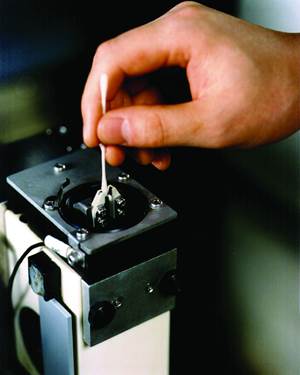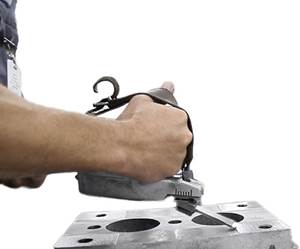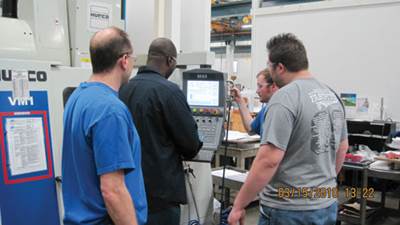How to Become a Qualified Tooling Vendor
RMM believes that moldmakers are to be proactive in “new” product design as well.
To give you a glimpse at what some potential customers may consider before contracting your shop, Rexam Mold Manufacturing (RMM) shares its structure for those evaluating and approving new tooling vendors.
Overall for RMM, delivery is becoming more and more critical. The quality aspect of mold building when dealing with top tier customers is a given. Meeting your time commitments and providing creative and solid mold designs is an essential element for success.
The top four factors RMM takes into consideration are: 1. control over quality and consistency provided in their product; 2. delivery; 3. size/number of employees; and, 4. design systems and engineering services (program management, product design or assistance, and automation).
Other determining factors for a long-term supplier partner include: one that is able to meet commitments (need to qualify “on-time delivery”); quality; excellent communication between the project engineers; timelines demonstrating a project’s progress; efficient reaction to part changes; continuous technology improvements; out-of-the-box thinking to decrease cycle time, and add efficiency and productivity into the entire mold manufacturing and product development process; and, competitive pricing.
These types of relationships are developed through open, honest, direct communication before, during and after the contract. This includes expression of compliments and concerns with equal directness. Do not promise something you cannot deliver or take advantage of any situation. Industry reputation will confirm a toolmaker’s history on performance.
As the relationship moves forward there are guidelines for managing expectations when it comes to views on the most important attributes that establish whether or not a vendor provides value as opposed to price. These include: know what you’re asking for; cheapest versus value-added; vendor may present another way to achieve your goal; do your due diligence on solving your challenges; dig into vendor reputations and experience; organize priorities; and, take small steps to build trust.
Tooling vendor relationships may not work if you cannot agree on the value proposition; are simply sourcing commodities; do not consider a vendor a partner; cannot show your cards; or, you seek the lowest price no matter who gets hurt.
Solid and creative engineering is the cornerstone for any successful program. All factors impacting mold and machine uptime must have critical consideration early on in the planning stages. It is essential that the mold design engineers consider details such as in-machine maintenance of the tool to extend up time, inserting delicate areas of the mold for ease of repair and create a design that will keep that mold in the press running longer with minimal but necessary maintenance.
RMM believes that moldmakers are to be proactive in “new” product design as well—requiring input on proper part design for faster cycles, less sink, thinning the wall stock for material savings, and proper mold manufacture for lower cost and simple maintenance. Mold specifications are provided for Engineering, Manufacturing and Qualification to eliminate any concerns about mold construction.
Although contracts are tedious to negotiate, they are more critical than ever because of corporate governance requirements; large-dollar purchases associated with manufacturing outsourcing put tooling vendor relationships on the radar screen for any financial auditor; and, well-structured contracts force discussion on important business terms that would otherwise be overlooked. The stronger the contract, the more likely it will pull in upper-level management. It is this type of a contract that will help in building relationships at a higher level. Think win/win and remember negotiation by definition, means mutual compromise.
For More Information:
Rexam Mold Manufacturing / (978) 906-1127
jeff.barhoff@rexam.com
www.rexam.com/mold
Related Content
How to Determine the Proper Vent Depth
Vent depth is critical to optimizing mold performance, so here is one approach to finding that elusive right number.
Read MoreMaintaining a Wire EDM Machine
To achieve the ultimate capability and level of productivity from your wire EDM on a consistent, repeatable and reliable basis, regular maintenance is a required task.
Read MoreRevisiting Some Hot Runner Fundamentals
What exactly does a hot runner do? If you’ve been in the injection molding industry for any length of time, you might think the answer is obvious, but it is not.
Read MoreThe Benefits of Hand Scraping
Accuracy and flatness are two benefits of hand scraping that help improve machine loop stiffness, workpiece surface finish and component geometry.
Read MoreRead Next
An Innovative Approach to Employee Training
This mold manufacturer looked within its own talent pool to develop—and implement—a new apprenticeship program to address the skilled workforce challenge.
Read MoreHow to Use Strategic Planning Tools, Data to Manage the Human Side of Business
Q&A with Marion Wells, MMT EAB member and founder of Human Asset Management.
Read MoreReasons to Use Fiber Lasers for Mold Cleaning
Fiber lasers offer a simplicity, speed, control and portability, minimizing mold cleaning risks.
Read More


















